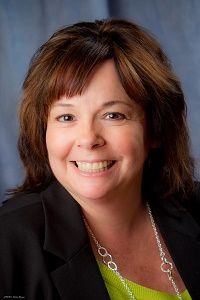Arizona Dentist Builds Career Serving Underserved Populations
Maureen Perry first became interested in dentistry as a child. As an adult, she found a calling in special care dentistry.

Maureen Perry, DDS, MPA, was a little confused as a child.
“I had a lot of dental work as a kid,” Perry recalls.
So, she and her mother frequented the dentist. And at the end of each visit, her mother would pay the dental assistant—who doubled as the receptionist in the small practice—at the front desk. That impressed Perry, who told her mother, “I think I want to become a dental assistant.”
Perplexed, her mother asked why, to which Perry replied, “Every time we go there you always give her money.”
Perry’s mother corrected her. “The money goes to the dentist, not to her.” Now fully informed, Perry changed her mind. “Oh, then I want to be a dentist.”
The irony, says Perry, the associate dean of A.T. Still University’s Arizona School of Dentistry & Oral Health in Mesa, AZ, and director of The Center for Advanced Oral Health, is that she wound up in academia and specialty care.
“It’s probably the least lucrative of all dental practices,” she laughs. “But I still have a lot of fun.”
Dentistry’s Changing Face
Perry has seen first hand the changing demographics in the field of dentistry. She recalls attending dental school 25 years ago when approximately one-third of her colleagues were women.
“It was a big deal,” she says, adding that instructors often remarked that, “We’ve never had this many women in a class.”
Today the demographics are more 50-50. Perry says it’s because dentistry is a great job for women since they’re not usually on call, and they can have regular hours. She also thinks it’s a societal issue.
“There are more women and more minorities going into dentistry because that’s the makeup of our society,” Perry explains. “There’s still a glass ceiling, but we’re getting there.”
It has also become more accepted.
“When I was a younger dentist people would think I was the hygienist,” Perry recalls. “They would ask, ‘When is the doctor coming in?’ And I would say, ‘I’m already here.’ But I think that’s old school now.”
Special Needs
Perry has also served as president of the Special Care Dentistry Association, a national organization promoting oral health for people with special needs. She defines people who need special care as falling into one of three or four groups. It includes people with educational or developmental disabilities; individuals with behavioral and cognitive disorders; geriatric patients who might be experiencing dementia or Alzheimer’s; and those patients with a complex medical history.
“We need to really look at the patient and say, ‘Well, does this patient need to be pre-medicated, or does the patient need to have laboratory work before it’s safe to treat them,’” Perry explains. “We need to touch base with their physician and work as a team.”
Perry’s attachment to these patients began when she was a young resident working at Jacoby Hospital in the Bronx, NY. Many of her patients were mentally disabled individuals who had recently been turned back into the community. But services for these individuals were sparse.
“The average dentist wasn’t trained for that,” Perry says. “So they would come to the hospital and I started seeing them. And I found that I really loved working with that population. It’s a really underserved population, and a very grateful population. And dentistry is certainly the most unmet need of patients with developmental and intellectual disabilities, from a healthcare standpoint.”
Training Future Dentists
The Center for Advanced Oral Health that Perry oversees encompasses the Rick Workman Advanced Care Clinic—a general dentistry clinic for people who need special care dentistry. Perry is responsible for the residents’ training, all the treatment they render, as well as all the patients.
“We have students who have had a lot of community service,” Perry explains. “Not just the kids who say they want to do it. They actually have to show us that they’ve had community service in order to even be interviewed for a spot in our dental school.”
Taking that approach means not simply accepting the brightest students who want to become dentists and teaching them about the underserved populations. It means taking young students who already work with underserved populations and turning them into dentists. And after 10 years, the program has been extremely successful.
“More than 30% of our current students are either working in public facilities, in hospitals, or in the armed services,” Perry says. “It’s not an experiment any more. It’s working, and it’s pretty exciting.”
Don’t Forget the Hugs
Perry laughs when asked about how she likes to spend her spare time.
“Yeah, I’ve heard that there are people who have spare time,” she says. “People ask, ‘What’s your hobby?’ And I say, ‘I don’t know. I work a lot.’”
Kidding aside, Perry describes herself as a “voracious reader” who feels that Kindle is the best invention ever.
“One click and I have a new book.”
She also likes to travel, most often for work, but her family will accompany her and they’ll tack on a few extra days. She’s done mission work with the US Navy in Jamaica, and also visited Qatar to work with the local government on developing a special needs program.
“It’s fascinating,” Perry says of her travel experiences. “It’s great to meet colleagues in different countries, and learn about what they’re doing.”
But the most rewarding aspect of her job, Perry says, is the hugs she receives from patients.
“Everyday we see patients who are so grateful, and they hug you, and they’re happy to see you,” Perry says. “That’s the most rewarding thing. It‘s like, the patients actually want to come to the dentist, and they love seeing you. That’s just great. I mean, that’s what it’s all about.”